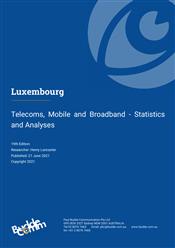Luxembourg Telecoms Market Report
Telecoms, Mobile and Broadband - Statistics and Analyses

Luxembourg’s MNOs extend 5G services following spectrum auction
Luxembourg has a small telecom sector dominated by state-owned POST Luxembourg. The Covid-19 pandemic has caused variable effects on overall sector revenue, with gains in the fixed-line segment though a significant drop in the mobile segment as travel restrictions reduced roaming revenue. There remains some pressure from regulatory measures, though no further reductions to fixed and mobile interconnection tariffs have been imposed through to 2024.
POST Luxembourg is extending the footprint of its 1Gb/s service in line with a government program to make Luxembourg the first fully fibred country in Europe. By early 2021 about 72% of premises could access such a service.
Investment in infrastructure is geared towards fulfilling these ambitions. Although the level of investment as a proportion of revenue has fallen in recent years, largely as a response to the completion of major projects, there was an increase in investment in 2020, partly due to the spectrum auction held during the year, as also to the continuing shift by POST Luxembourg to an all-IP platform and the rollout of fibre infrastructure.
High mobile penetration has slowed subscriber growth in the mobile market since 2005, though a recent law requiring SIM card registration has not had an adverse effect on the number of mobile subscribers despite network operators deactivating unregistered cards.
BuddeComm notes that the outbreak of the Coronavirus continues to have a significant impact on production and supply chains globally. During the coming year, the telecoms sector to various degrees is likely to experience a downturn in mobile device production, while it may also be difficult for network operators to manage workflows when maintaining and upgrading existing infrastructure.
Overall progress towards 5G may be postponed or slowed down in some countries.
On the consumer side, spending on telecoms services and devices is under pressure from the financial effect of large-scale job losses and the consequent restriction on disposable incomes. However, the crucial nature of telecom services, both for general communication as well as a tool for home-working, will offset such pressures. In many markets the net effect should be a steady though reduced increased in subscriber growth.
Although it is challenging to predict and interpret the long-term impacts of the crisis as it develops, these have been acknowledged in the industry forecasts contained in this report.
The report also covers the responses of the telecom operators as well as government agencies and regulators as they react to the crisis to ensure that citizens can continue to make optimum use of telecom services. This can be reflected in subsidy schemes and the promotion of tele-health and tele-education, among other solutions.
Key developments:
- Regulator completes multi-spectrum auction for 5G, ditches plan to assign 26GHz band for 5G following lack of interest;
- POST Luxembourg extends G.fast services, upgrades network with XGS-PON technology to provide symmetrical 10Gb/s service;
- POST Group reports 0.3% revenue growth in 2020, reflecting the effects of the pandemic;
- Report update includes the regulator’s market data to December 2020, State Statistics Office market data updates, telcos’ financial and operating data to Q1 2021, Telecom Maturity Index charts and analyses, assessment of the global impact of Covid-19 on the telecoms sector, recent market developments.
Companies mentioned in this report:
POST Luxembourg, Cegecom, Tango, Telecom Luxembourg
Related Reports
- Europe - Mobile Network Operators and MVNOs
- Montenegro - Telecoms, Mobile and Broadband - Statistics and Analyses
- Denmark - Telecoms, Mobile and Broadband - Statistics and Analyses
- Czech Republic - Telecoms, Mobile and Broadband - Statistics and Analyses
- Greece - Telecoms, Mobile and Broadband - Statistics and Analyses
- Cyprus - Telecoms, Mobile and Broadband - Statistics and Analyses
- Belarus - Telecoms, Mobile and Broadband - Statistics and Analyses
- Austria - Telecoms, Mobile and Broadband - Statistics and Analyses
- Hungary - Telecoms, Mobile and Broadband - Statistics and Analyses
Share this Report
TMT Intelligence
A platform to scale your intelligence tasks
Monitor critical insights with our AI-powered Market Intelligence Platform gathering and analyzing intelligence in real time. With AI trained to spot emerging trends and detect new strategic opportunities, our clients use TMT Intelligence to accelerate their growth.
If you want to know more about it, please see:
Research Methodology
BuddeComm's strategic business reports contain a combination of both primary and secondary research statistics, analyses written by our senior analysts supported by a network of experts, industry contacts and researchers from around the world as well as our own scenario forecasts.
For more details, please see:
More than 4,000 customers from 140 countries utilise BuddeComm Research
Are you interested in BuddeComm's Custom Research Service?
Hot Topics
News & Views
Have the latest telecommunications industry news delivered to your inbox by subscribing to BuddeComm's weekly newsletter.